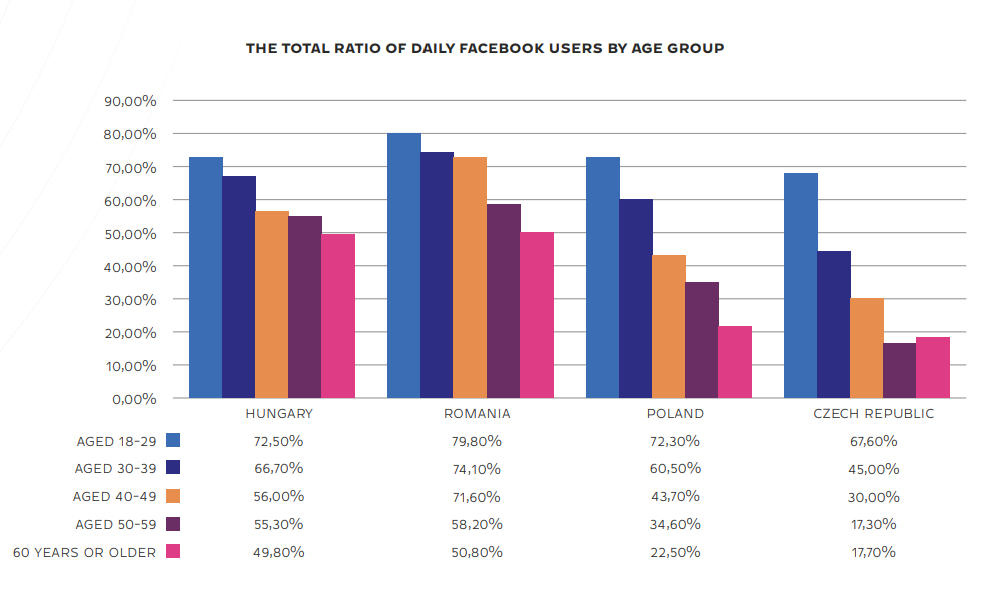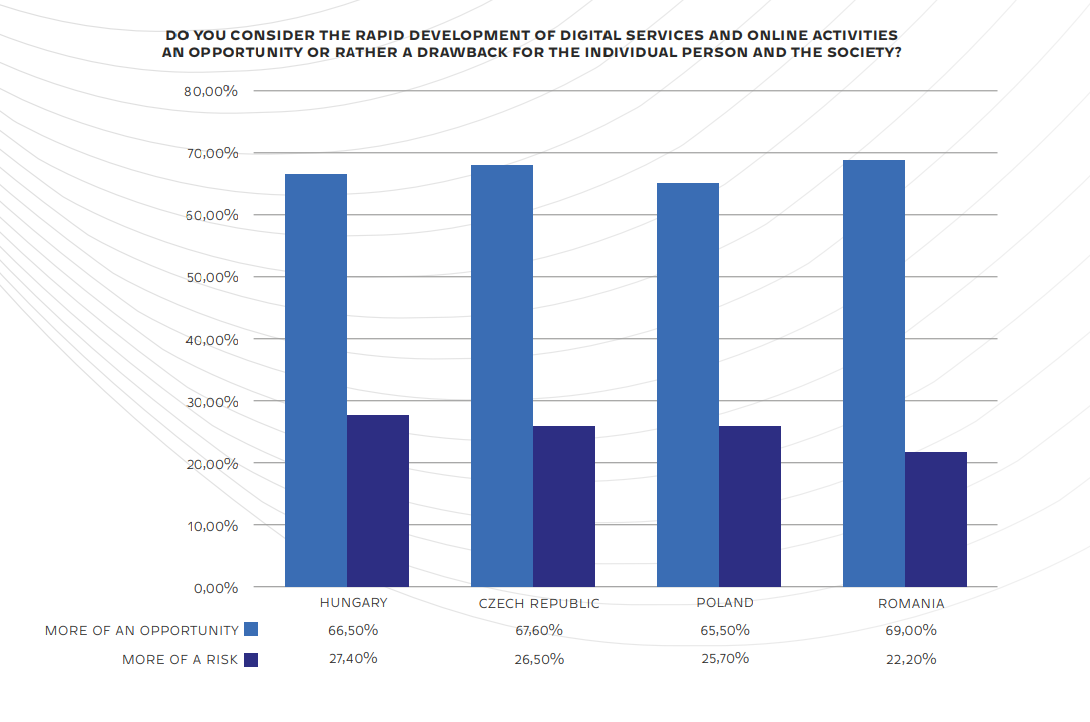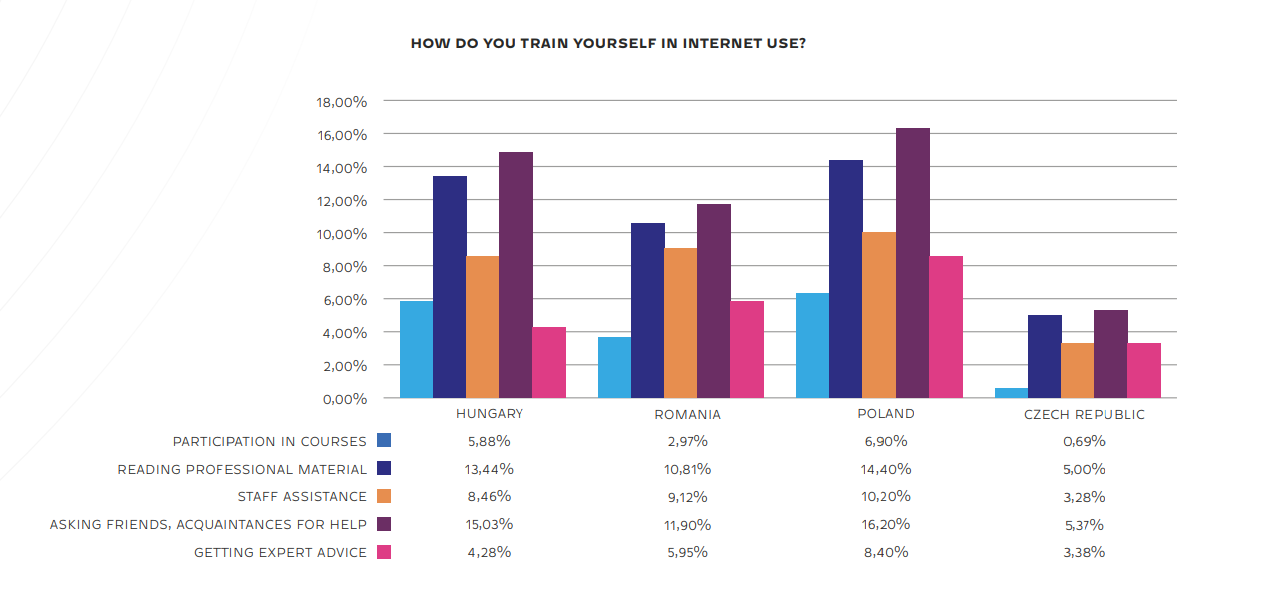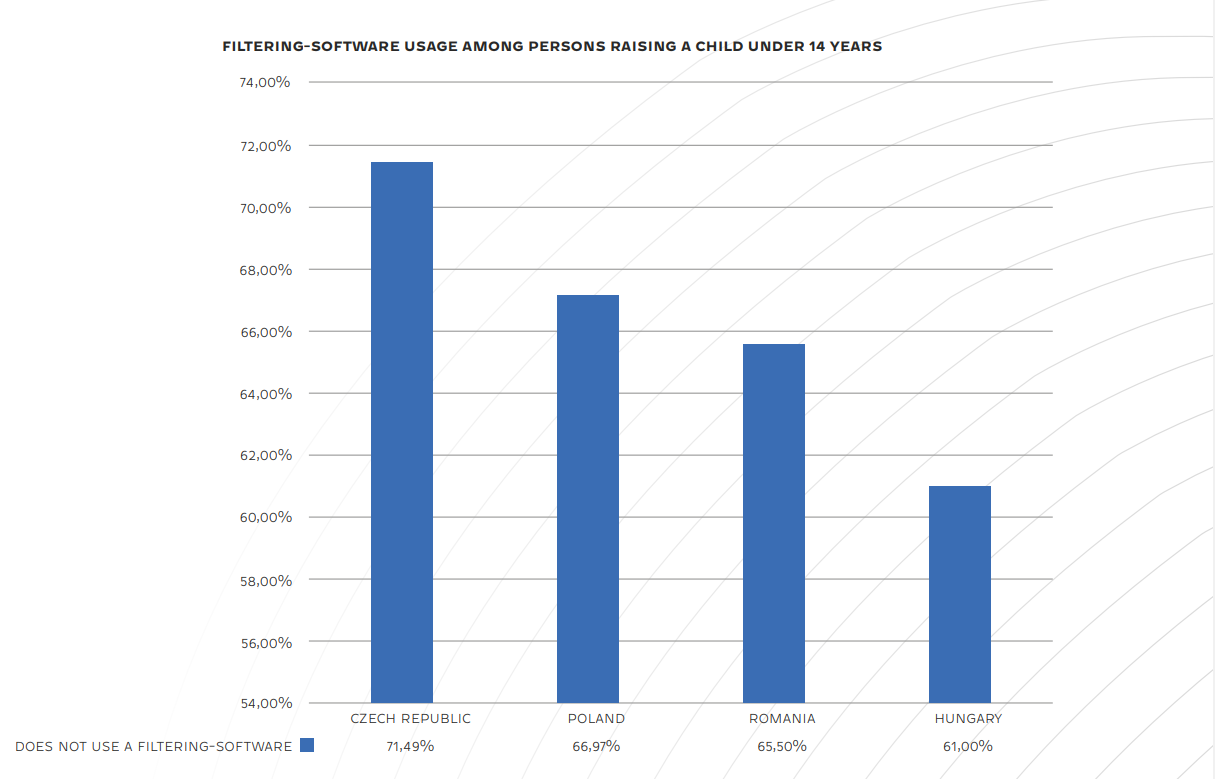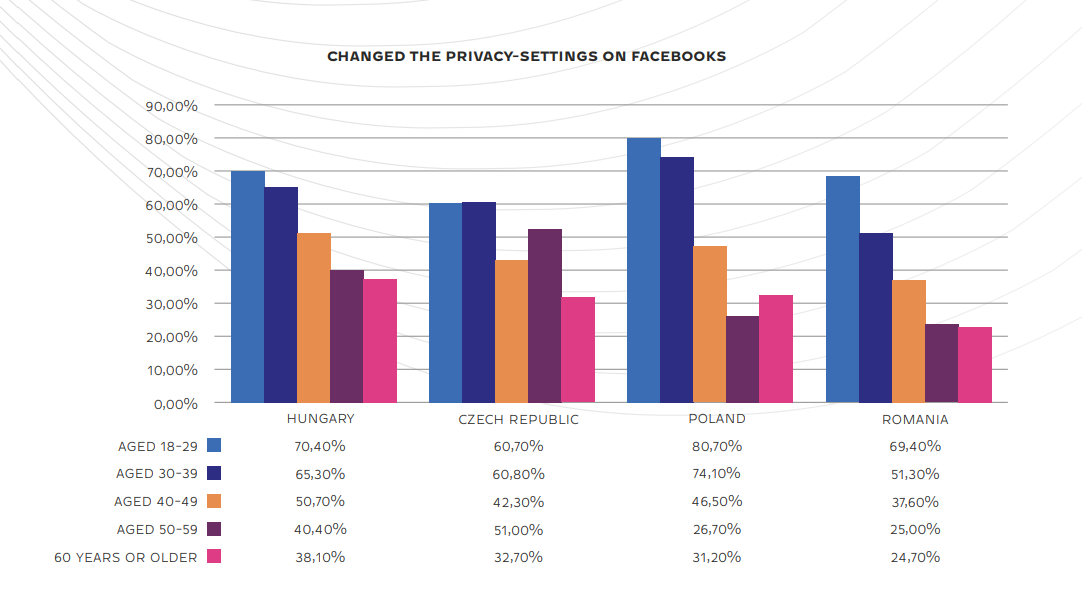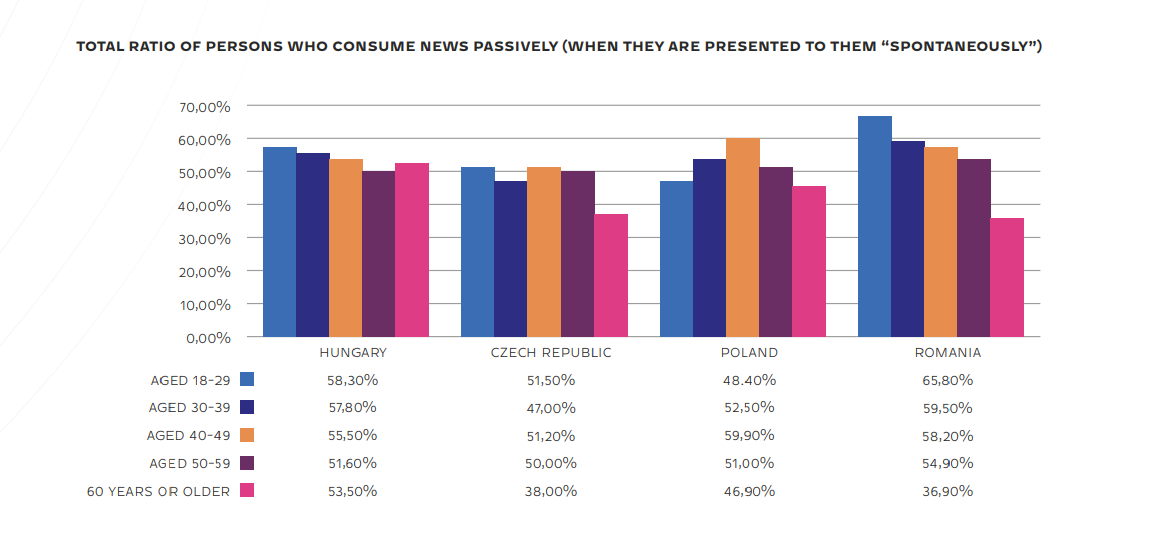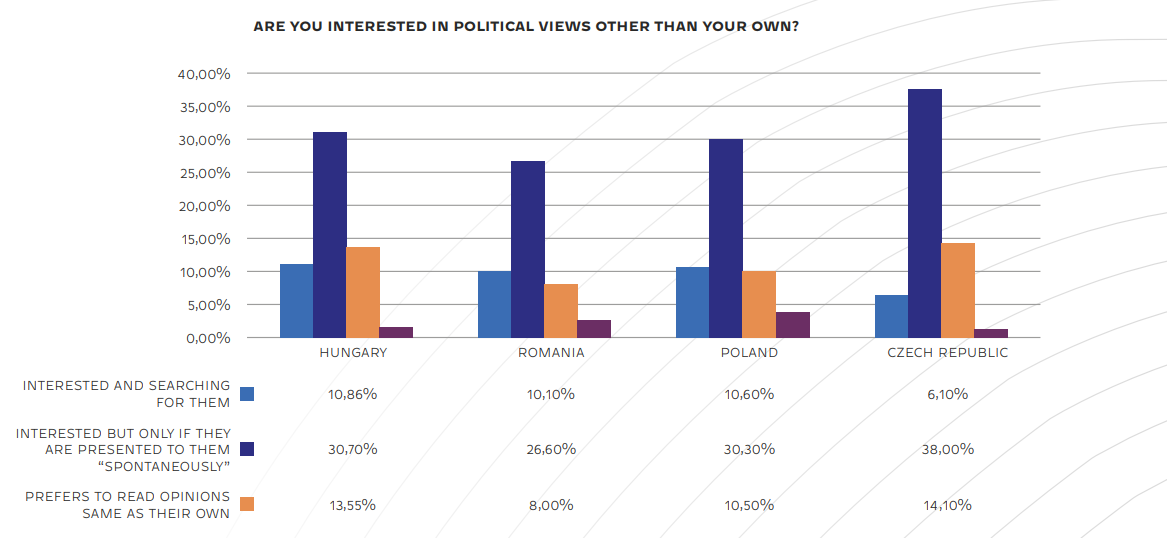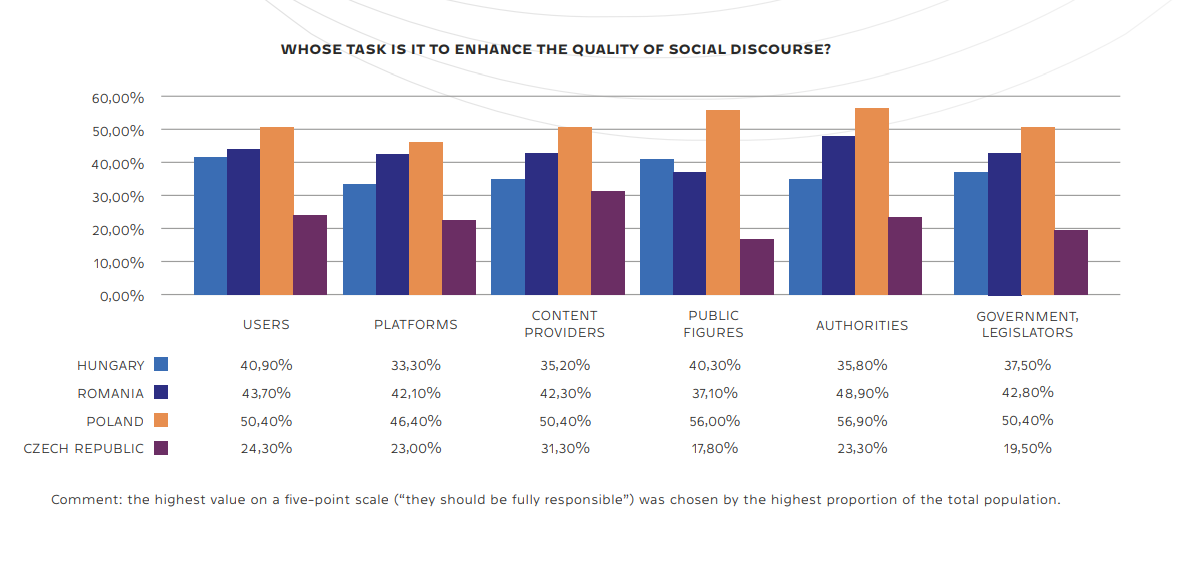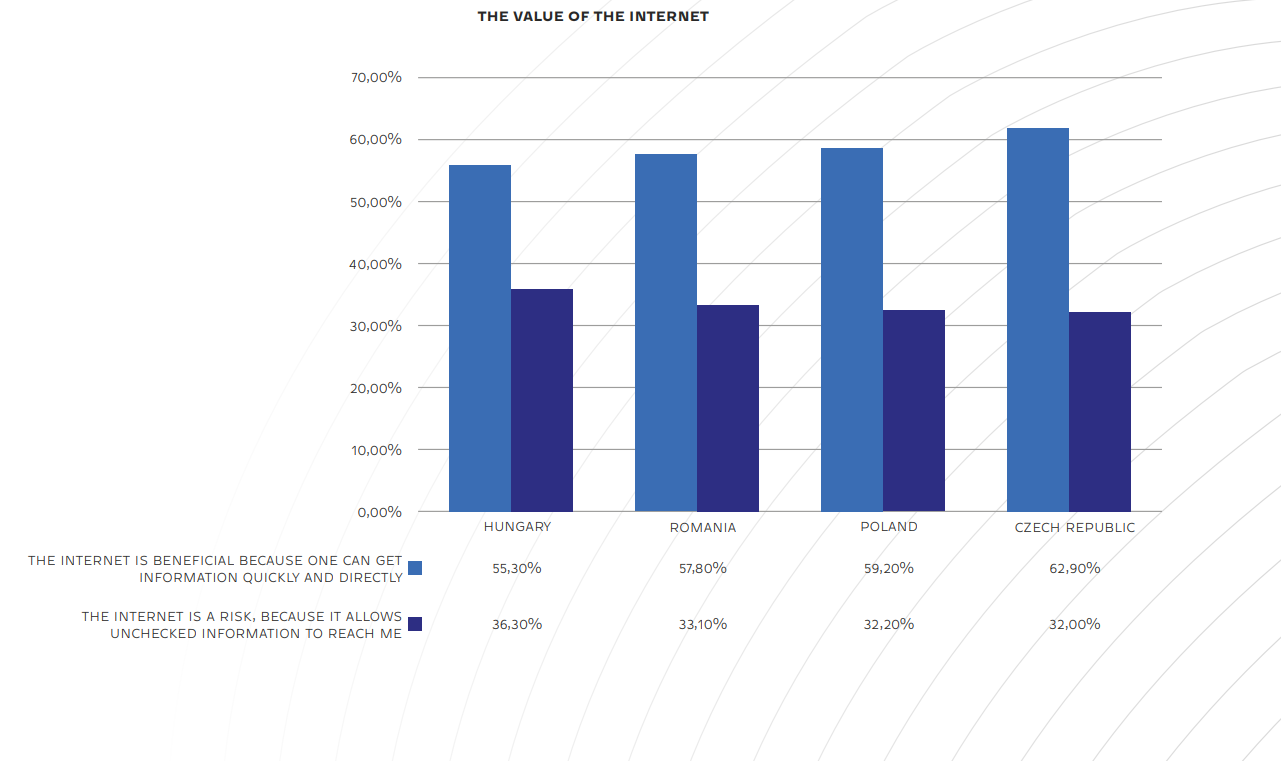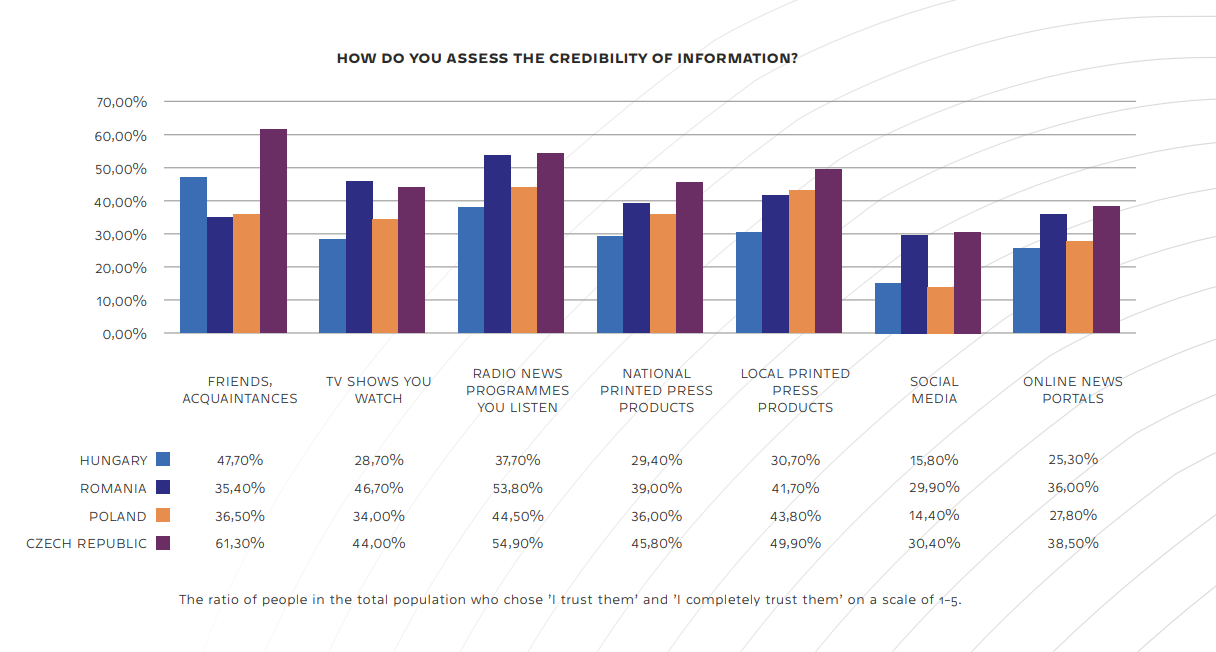Data from a comparative study in Central and Eastern Europe
This study by the Institute of the Information Society of the University of Public Service, involving four Central European countries: the Czech Republic, Poland, Hungary and Romania, examined the characteristics of the use of information technology by the adult population in the region, mainly for communication purposes. A telephone survey was conducted in October and November 2019, and the results are representative of the population over 18 years of age in the four countries categorised by age, gender, education, type of settlement and region.
Main conclusions of the research
- Hungarians are the most afraid of online communication having a negative effect on their personal relationships. According to 60.5% of the total Hungarian population, online communication degrades the quality of personal relationships. This view was held by 50.7% in the Czech Republic, 38.9% in Poland and only 29% in Romania. At the same time, the region is uniform in its judgement on the benefits of the Internet. The evaluation of new communication opportunities and the positive impact of digital culture on society did not differ significantly from country to country.
- Facebook has a remarkably strong market position among social media platforms, and its position is the most dominant in Hungary. It is typical for the whole region that, compared to Facebook, the other social media interfaces hardly get a kick of the ball, but of the four countries, this is the most striking in Hungary. While in the Czech Republic and Poland an age gap can be identified in the use of Facebook, in Hungary and Romania the older age groups are also definitely present on the platform.
- A high degree of awareness about internet use is not typical in any of the countries examined. Although people are aware of the dangers online, they do not defend themselves or their families from them through training or filtering software. The same is true as regards data protection: the majority of the respondents were aware of the importance of data protection and is distrustful of online data controllers, yet they do not do anything about the security of their data.
- Significant differences can be observed between the countries of the region in terms of trust in information sources and fear of manipulation. A comparative analysis of the four countries revealed significant differences regarding fear of manipulation and trust in the information received. The vast majority of the Hungarian population is not afraid of being manipulated by specific actors in the online world. Hungarian behaviour in this regard is most similar to Romanian users. In Hungary, people are the most distrustful of advertisers (23%) and in Romania of politicians (22.5%). The general fear of manipulation is higher in the Czech Republic and Poland, and the highest levels of mistrust (measured for advertisers in both countries) were also much higher (52% and 40%, respectively).
- There is significant development potential in the field of e-business and e-government among the older residents of the region. Information literacy is already satisfactory, but there is still a long way to go in terms of levels of usage, which holds great potential for the public and business sectors in all four countries. There are also great opportunities in the field of quality of life improvement and preventive medicine online services.
1. Patterns of usage
Comparing the number of respondents who use the Internet for news consumption on a daily basis, the largest difference between the five age groups [1] in Hungary is only 4.4%. Thus, Hungary is in a unique situation within the four countries studied, as the greatest variations in this were 31.9% for the Czechs, 19.2% for the Poles, and 16.9% for Romania. In the area of news reading, older people sometimes even outperform young people. Only in Poland does a small proportion of the oldest age group use the Internet for news consumption on a daily basis than people aged 18-29, with the older age groups consuming more news online than young people in the other three countries surveyed. Among the social media platforms, Facebook is in a dominant position. 7-8 out of 10 people in the youngest group use Facebook on a daily basis, while for the oldest age group this proportion is 2-5 people out of 10. In the Czech Republic and Poland, the proportion of people who use Facebook significantly decreases over the age of 50 , while Hungarian and Romanian data show a high levels of Facebook use in all age groups. Other social media applications are used by 27-45% of the total population. In the field of online entertainment, there is an especially significant difference between the youngest and the oldest respondents. 90% of the youngest watch films online, while only 34-42% of the oldest people surveyed do so at most. The proportion of people listening to music on the internet is similar to films, at 90% for the youngest age group, while it is much lower among the oldest group (38-63%). For content sharing, the proportion is 75-85% versus 40%.
There are differences between the countries surveyed in their willingness to pay for the content consumed. Hungary has the highest proportion of those who watch movies or listen to music exclusively on free sites or via free downloads. The proportions of people who only watched films online without paying was three-quarters of the respondents in Hungary, two-thirds in the Czech Republic, and about half of the people in Poland and Romania. Online shopping is also more widespread among the youngest of the age groups surveyed (72-95%), with significant variance between the oldest respondents by country (Hungary 51.6%, Czech Republic 62.9%, Poland 43.9%, Romania 26%), but this area can definitely be developed, as between half and three-quarters of the elderly respondents do not shop online. As can be seen, the older age group is very active in of its internet use in several areas in the countries studied, but there is a significant lag in terms of e-business.
2. The attitude towards the Internet varies from country to country
The results of the research suggest that, while the attitude of the Hungarians to the internet is ambivalent, (there is a tension between the data on usage and some quantifiable elements of attitude), the situation cannot be said to be as polarized in the Czech Republic, Poland and Romania. According to the 60,5% of the Hungarian population, the means of online communication are worsening the quality of the personal relationships, although 63% believe that social media represents an excellent way of staying in touch with family and friends. In this respect there are spectacular differences between the attitudes of the countries: while in the Czech Republic 50.7 %, and in Poland 38.9% thinks that online communication has a negative effect on personal relationships, this ratio is only 29% in Romania. Concerning the potential of the internet for personal communication, the Czechs and the Romanians represent the two extremes with 51.5%, and 74.6%, while Hungarians and Polish are in between, with similar proportions of them, (62.7%, and 64.5%) deeming social media as having the potential to benefit personal communication. 80% of the Hungarians view it as an advantage of the internet that one can keep in touch with friends, and in this respect there is no significant variation amongst the three other countries: Czech Republic 67.8%, Romania 74%, Poland 76.1%. However, 58% are afraid that online communication means will take over the role of personal communication. This fear is the highest in Hungary, but the figures of the three other countries show no significant difference. (Czech Republic 45.2%, Poland 45.6%, Romania 49.9%). Moreover, 57% in Hungary believe that online communication takes up too much time of one’s life. This figure is nearly the same for respondents in the Czech Republic, (58.4%), which is significantly more than in Poland, (44.7%), and Romania (36.8%). Despite these ambivalent feelings, a palpable majority view digital services, and the rapid development of online activities more as opportunities than drawbacks for the individual person and the society.
3. Typically lack of awareness
Though preparation for the use of Internet (media literacy) is gaining ground at the lower levels of formal education, among adults the various forms of self-training are worth nothing. In this field we measured very low values in all the countries in this study. Even the highest figure is less than one-third of the population. The ratio of those who claim to train themselves in internet use is 28.2% in Hungary, 25.7% in Poland, 16% in Romania, and 8.8% in the Czech Republic. These people use multiple information sources simultaneously, and ask their friends and their acquaintances for help. This is followed by the study of various professional materials. The following diagram illustrates the use of different sources by those who self-train themselves. The level of use of Internet filtering software is also very low. In Hungary and in the Czech Republic 71% of respondents do not use it, while in Poland 67% and in Romania 65% of the total population does not use any form of filtering software in order to block harmful content on the Internet.
The level of consciousness is not higher amongst families with children either. 61% of respondents from Hungary with families with a child under 14 do not use parental control software. This figure in Romania was 65.5%, in Poland 67% and in the Czech Republic I was 71.5%. 37% percent of the respondents said that they had refrained from an activity on the Internet at least once due to fear of leaving a digital trace. The dispersion in this respect is very high in the region: in the Czech Republic and in Romania it is lower, (at 26% and 30%), but the ratio of those who are refraining from using the Internet out of the fear of leaving a “digital footprint” is significantly higher in Poland (56%).
4. We do not care much about or data on Facebook
Less than half of the people in the region surveyed concern themselves with data protection, despite the fact that many of them do not trust online data processors. In Hungary 46.9%, in the Czech Republic 47%, in Poland 40%, and in Romania 55% of the respondents have never changed the privacy settings on Facebook. The youngest cohort (18-29 age) exhibited the greatest awareness in this respect in all the countries in the region, and the older the person interviewed, the less they consider this question.
These numbers seem very low especially in the light of the fact, that very few feel that their data is safe on Facebook: 4% of the Hungarians, 2.9% of the Czechs, 1% of the Polish, and 12.9% of the Romanians. This distrust is the most common in Hungary of the countries of the region. Here 41.8% of the people feel that their data is not safe at all on Facebook, compared to 24% in the Czech Republic, 22.9% in Poland and 35.5% in Romania. In general it can be stated that in most of the countries people feel that their data is quite insecure on Facebook.
5. News consumption is passive, but journalism is considered to be important
54% of the people interviewed in Hungary use the internet for news consumption daily, 14% more than once in a week, and 8% more than once a month. The ratio of daily news consumers is higher only in Poland (above 60%), while in the Czech Republic this figure is 44.6%, and in Romania it is 42.3%. If the daily consumers are added to those who consume news on the Internet at least weekly and monthly, the sum, 76%, is very similar with that for Romania at 72%, while in the Czech Republic and Poland it is higher at 87-88%. The role of social media in news consumption is very significant in Hungary: 75% of Internet users access the news via social media with varying degrees of frequency; this figure is very similar, although slightly lower than the Hungarian level in the three other countries of the region, at 67-68%. The majority of respondents consume political news passively in the three countries of the region, which means that they inform themselves only from news that is offered to them. In Hungary 34%, in Poland and Romania only 29-29% of the respondents said that they search for political news themselves, and active news consumption is only prevalent in the Czech Republic, where this is true for almost half of the people interviewed (49%).
Respondents’ level of interest in political news displayed significant differences across the countries surveyed. The two extremes are the Czech Republic and Poland, where, of the people interviewed, 3.6 and 19.3% respectively stated that they are not interested in these topics. There were very similar attitudes, however, in the four countries towards the different political standpoints: between five and six out of ten declared that they are interested in political views other than their own, but only if these are presented to them “spontaneously”. These data about passive information-gathering are particularly noteworthy in the age of algorithm-driven news consumption.
In Hungary, the majority (54%) prefers it if they can access the news items directly without evaluation and comments. Hungary represents a middle value in this respect, along with Romania (52%), because in the Czech Republic this figure is lower (45%), while in Poland it is higher (62%). The reverse of this, a preference for consuming news with evaluation and comment was professed by 32% in in Poland, and 40-45% in the other three countries. The majority in all three countries think that the activity of newspapers and journalists is a very important part of the social dialogue. (Czech Republic 55%, Romania:58%, Poland and Hungary 61%.
6. The internet in public discourse
A similar pattern can be observed regarding the opinion that the internet is beneficial because it allows ordinary people to share their opinions with other members of the public (Romania: 47%; Poland and Hungary 49-49%; the Czech Republic: 54%), and the difference is even less significant in the proportion of those who said that they perceived the internet as a risk because it allows the free circulation of views that posed a threat to social coexistence (40-44%). However, the societal judgement on anonymous commenting was rather negative in Hungary, with a significant difference from the figures measured in the three other countries. In Hungary, two-thirds of the persons interviewed deemed this feature harmful because it encourages irresponsible communication; in Poland this figure is 58%, and is less than 50% in the Czech Republic and Romania (49% and 44%). In the four countries, the proportion of people who hold the opposite opinion, believing that this form of communication is a good thing because it allows for many people to express their opinion ranged from 26.5% (Hungary) to 47.7% (Romania). The results of the research clearly show that in all of the four countries people believe that the improvement of the social discourse on the internet is the shared responsibility of all affected parties (e.g., of the users, platforms, content providers, politicians, authorities and government).
7. Facebook is a highly significant forum for public discourse
Several questions aimed to address the Facebook usage habits of internet users in all of the four countries. The data on usage shows that, in all of the countries, Facebook is the social media service with an extraordinarily strong market presence. While at least seven out of ten internet users use Facebook more than once in a month in all of the countries investigated (Romania: 85%; Hungary: 79%; the Czech Republic: 70%; Poland: 67%), all the other social media platforms (Twitter, Instagram, LinkedIn etc.) are used on a monthly basis by a much lower proportion of internet users. This figure is the lowest in Hungary (27%), while the ratio is somewhat higher in Poland (33%), followed by Romania (37%) and the Czech Republic (45%). The survey also covered the issue of the moderation practices of Facebook, namely how often the platform removes users’ posts. Besides Hungary (10.1%), in Poland (9.8%) and in the Czech Republic (9,5%), almost one in ten Facebook users stated that they had had posts removed by Facebook or had been temporarily banned from using the service; this figure is somewhat higher in Romania, where one in seven interviewed persons (14%) had experienced a similar incident.
The individuals affected expressed in different proportions whether they were satisfied with the justification received from the service provider for the moderation. 45% in Romania, 36% in Hungary, 27% in Poland and only 17% in the Czech Republic found the reasons for removing or banning their content or comments satisfactory. It should be noted that only 33-48% of those affected did not receive any information from Facebook at all. The results on the role of Facebook in the public discourse are remarkable: at least three out of four Facebook users in Hungary and Romania, and even more in the Czech Republic and Poland, roughly nine out of ten use the service at least weekly for news consumption. For all four countries, it can be stated that, one in two of the people surveyed agreed, at least by and large, with the statement that Facebook is excellently suitable for use as a social forum (for conducting public activities and expressing opinions) or for news consumption. The proportion of those who agreed with this view is 42% in the Czech Republic, 46% in Hungary and Poland, and 55% in Romania.
8. There is no significant age-gap in general attitudes
The results of the research show that there are no significant differences in the general attitude towards the digital world between age groups in Hungary nor in the other three countries examined in the research, apart from some extreme, exceptional cases. whether the possibility of communicating online is detrimental to the quality of personal relationships, it can be observed that a similar proportion of the members of the youngest (age 18-29) and the eldest (older than 60) age groups gave an affirmative answer in the three countries examined (Hungary, 58.3% vs. 61%; Poland 33.8% vs. 35.5%; Romania 28,4% vs. 23,5%), while there is a significant age gap on responses to this question in the Czech Republic (27.5% vs. 56%). The difference between the opinions of people of different ages in the countries surveyed is even smaller when it comes to the question of whether communicating online is too time-consuming (Hungary: 57.7% vs. 53.2%; Czech Republic 52.6% vs. 56.5%; Poland: 34.9% vs. 39.4%; Romania: 37.2% vs. 34.6%). In all of the countries examined a clear majority of people in every age-group think that the internet is beneficial in information gathering because it allows information to be collected swiftly and directly.
It is also true for every age group in all four counties, that the vast majority sees the swift development of the digital world as a positive opportunity, as opposed to a minority who think of it as a risk. While there are differences between the absolute figures in each country, there are no significant differences between age groups as percentages (Hungary 24.5% vs. 29.9%; Poland 24.8% vs. 30%; Romania 23.7% vs. 20.6%). The only different pattern can be observed in the Czech Republic, where a much lower percentage of the members of the youngest age group (7.2%) considers the digital world a risk, compared to the eldest (37.6%).. On some questions, especially the ones concerning societal discourse, a significant difference can be observed between the approaches of the younger and older generations:
- In Hungary 60% of the youngest think that it advantageous that people can share their opinion with the public on the internet while 36% considers it a risk, because it allows for the free flow of dangerous views. The percentages holding these opposing views within the oldest age group are 40% and 46% respectively. This tendency also holds in the Czech Republic and Poland; only Romania differs significantly on this question. In Romania the distribution of respondents who believe that the internet is beneficial (46.9%) and of respondents who consider the internet is a risk (44.5%) is almost completely even, with only minor differences between the opinions of the youngest (46.8% vs. 45.7%) and the eldest (46.3% vs. 42.1%) citizens.
- Among the youngest, many more of the respondents expressed a positive opinion on the ability to make anonymous comments. While the majority in Hungary (56%) within this age group thinks anonymous commenting is a harmful phenomenon leading to irresponsible statements, for many (41%) it is a solution that provides a possibility for exercising free speech. Among the oldest of the cohorts 70% disapproved of anonymous comments and only 19% saw a possible upside to it. Compared to Hungary, a similar tendency can be observed in Poland in this regard: while 53.7% of the youngest think that commenting is harmful (43.6% thinks that it is a good thing), the proportions of answers to this same question are strikingly uneven within the oldest age group (60.4% vs. 28.9%). In Romania and the Czech Republic the proportions are a lot more balanced: all figures are within the 42-61% range (including the groups pro and contra commenting, across both the youngest and eldest groups).
- There are huge differences in judging the societal usefulness of journalists. In Hungary the majority of the youngest age group (52%) consider journalism an important part of societal discourse, while according to 44% in the age of internet there is a smaller demand for newspapers and journalists. In comparison, for the eldest generation the proportions are 63% and 27% respectively. The perception of the value of journalists is similar in the other three countries participating in the research; i.e. a larger proportion of the oldest generation thinks that the role of journalists is important in preserving the quality of societal discourse. Only the youngest group of Czech respondents formed an exception, expressing a greater disapproval of journalists (61.6%) with fewer appreciating the value of their work (37%).
9. Significant differences in fear from manipulation
The majority of the members of the Hungarian population are not afraid of being manipulated by specific actors [2] of the online sphere. The most feared source of manipulation was advertisers, and even that barely reached 23%. Attitudes towards manipulation online in Romania showed similar results to Hungary, because in its Eastern neighbour country 1/5 of the internet users reported fear of manipulation perpetrated by only one category of online actors, in their case politicians (22.5%). %). A significantly different attitude was present in the other two countries. In the Czech Republic there are no actors, except for acquaintances (11%) who were not feared as potential manipulators by at least every fifth internet user. As regards advertisers, fear of manipulation was expressed by every other person (52%), but almost 1/3rd of the respondents also have a similar attitude towards civil organizations (31%), machine-created content and social media platform (29-29%). The situation is similar in Poland, only with slightly less extreme figures: except for manipulation by acquaintances (13%) and social organisations (17%), at least 20% of internet users are afraid of being manipulated by other actors, with advertisers (40%) the most feared in this regard; there where several actors who more than 30% viewed as potential manipulators, for example politicians (37%), machine-generated content (35%), the government (33%) and foreign powers (31%). The majority of people do not trust the credibility of information sources. The level of trust towards certain information sources only reaches 50% in the Czech Republic: 61% has trust towards friends and acquaintances, 55% towards radio news programmes and 50% towards the local printed press. There is distrust towards information coming from social media in every country: only 14% of the Polish, 16% of Hungarians, 30-30% of the Czechs and the Romanians trust it.
